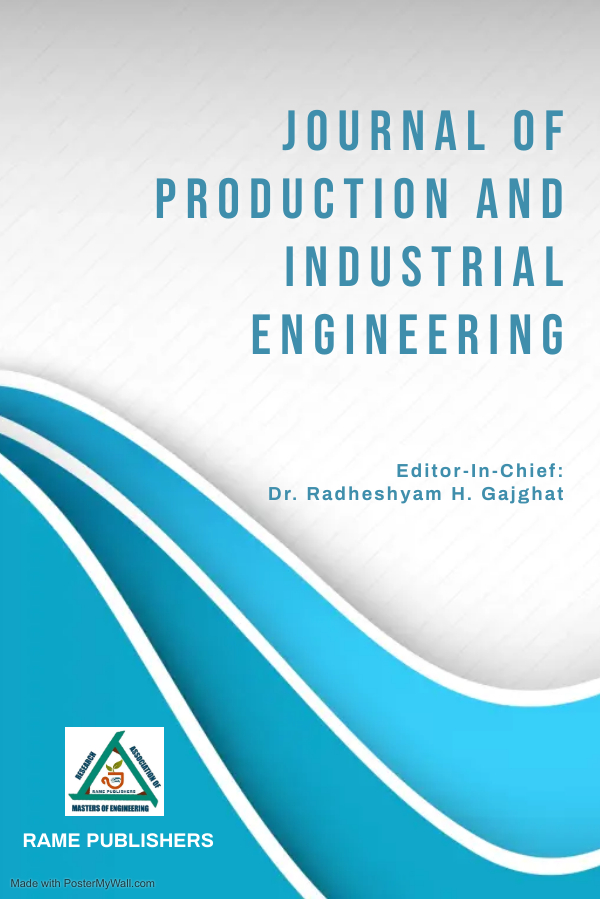Smart Cart for Physically Challenged Person
Anand Kumar Prajapati, Aditya Yadav, Abhishek Kumar Yadav, Amit Singh, Vishnu Pratap Singh
Journal of Production and Industrial Engineering
Volume 4: Issue 1, Jan-June 2023, pp 51-54
Author's Information
Amit Singh
Corresponding Author
Department of Mechanical Engineering, Buddha Institute of Technology, GIDA, Gorakhpur, India.
bit19me041@bit.ac.in
Anand Kumar Prajapati, Aditya Yadav, Abhishek Kumar Yadav, Vishnu Pratap Singh
Department of Mechanical Engineering, Buddha Institute of Technology, GIDA, Gorakhpur, India
Abstract:
Generally, a person with physical disabilities restricts his movement within a house or building due to his dependence on other people. People with disabilities are not only dependent on others for their movement but also for food. Devices available in the market only allow them to relocate but they have to put efforts which put them under stress. The purpose of this study is to investigate an alternative to those devices to provide a way of relocation as well as a method of earning for themselves. Designed battery operated vehicle motivates the person to become an entrepreneur and problem of unemployment of disabled section will also be solved simultaneously.Index Terms:
Disabilities, unemployment, stress, physically challenged, battery.REFERENCES
- Deep Ranjan Majumdar, Tushar Joshi. Merit sand Challenges of E-Rickshaw as An Alternative form of Public Road Transport System : A Case studying the State of West Bengal in India. 2015 International Conference on Alternative Energy in Developing Countries and Emerging Economies.
- Jayaprabakar, Saikiran, Paranthaman, Nirmal Raj, Arun kumar, Design Of Affordable Electric Vehicle for Handicapped, Department of Mechanical Engineering, Sathya bama University, Chennai, India. International Journal on Design and Manufacturing Technologies, Vol.10, No.2, July2016, Pg.No.4-6.
- Dr. Aparna Marwah , Dr. Diljeet Singh Bajwa. E-Rickshaws in Delhi-A Green Project : Mythor Reality , International Journal o Management & Social Sciences ; Vol.05 , Issue01(2016) Pg.no. 17-20.
- Amos G. Winter, V PhD Student, “Assessment to Wheel chair Technology in Tanzania”, Department of Mechanical Engineering Massachusetts Institute of Technology Cambridge, 02139. International Journal for Service Learning in Engineering Vol.2, No.1, Fall2006ISSN1555-9033, Pg.No.60-77.
- Vishal Upadhyay , “Design of Scooter for Physically Handicapped with Foldable Hood”, Department of Industrial Design National Institute of Technology Rourkela-769008, Orissa, India, May2015, Pg.No.1-47.
- Manoj Kumbhalkar, Mhalsakant M. Sardeshmukh, Dattatraya V. Bhise, Sumant A. Choudhari, Kishor Rambhad, Pramod H. Sahare, Narendra K. Ade, “An insight into conversion of internal combustion engine (ICE) vehicle to electric vehicle for green transportation technology”, Multidisciplinary Science Journal, volume 5, issue 4, 2023. https://doi.org/10.31893/multiscience.2023040
- Pramod H. Sahare, Manoj A. Kumbhalkar, Dhananjay B. Nandgaye, Sachin V. Mate, Hemlata A. Nasare “Concept of Artificial Intelligence in Various Application of Robotics”, published in International Proceeding of Economic Development and Research, Volume 6, ISSN 2010-4626, pp 115-119, 2011.
- Pranit A. Dhole, M. A. Kumbhalkar, Gajanan V. Jadhav, Akshay S. Dalwai, “Recent Trends in Transportation Technology as Hybrid-Electric Vehicle: A Review”, IOSR Journal of Mechanical and Civil Engineering (IOSR-JMCE), Volume 7, pp 4-8, 2018
To view full paper, Download here
To View Full Paper
For authors
Author's guidelines Publication Ethics Publication Policies Artical Processing Charges Call for paper Frequently Asked Questions(FAQS) View All Volumes and IssuesPublishing with




